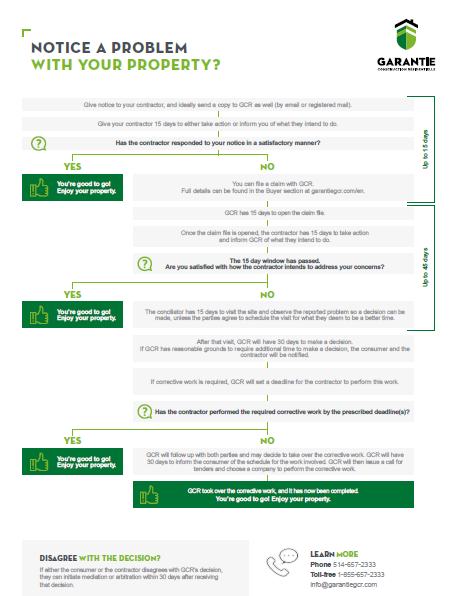What coverage applies before I declare acceptance of my property?
The guarantee applies at multiple stages. The types of coverage that are applicable before the building is accepted are:
- Reimbursement of advance payments to a maximum of $50,000
- Completion of work to a maximum of $300,000 for a single‑family house or $200,000 per unit for a condo
- Coverage for relocation, moving and storage, upon the presentation of vouchers and provided that no unjustified profit results therefrom, to a maximum of $6,000
What guarantees apply after I declare acceptance of my property?
- 1 year after acceptance of the building, for repair of poor workmanship that existed but was not apparent at the time of acceptance
- 3 years after acceptance of the building, for repair of latent (hidden) defects
- 5 years after the end of work, for repair of faulty design, construction or production (execution) or the unfavourable nature of the ground
What is poor workmanship?
Poor workmanship is any work that is poorly done or not carried out properly according to applicable norms (standards). These norms are laid out in the terms of the contract and defined as per trade practice. These defects in workmanship are minor, and must be identified in the document that you will fill out at the time of the pre-acceptance inspection of your building.
What is a latent defect?
A latent (hidden) defect is a serious, non‑apparent defect in construction that dates back to before acceptance of your home but was unknown to you at the time of that acceptance. Latent defects must be declared in writing to the contractor and GCR within a reasonable amount of time.
What is faulty design, construction or production of the work, or the unfavourable nature of the ground?
Faulty design, construction or production (execution) of the work, or the unfavourable nature of the ground, is one or more serious defects, whether apparent or not at the time of acceptance of your home, that affect the solidity of the building or cause serious risks.
I am selling my house before the end of the guarantee. What does that mean for its coverage?
The guarantee is transferable. If you sell your house during the term of the guarantee, the coverage will automatically transfer to the new owner for the remainder of the term. Please contact our customer service team at 514‑657‑2333 or go to our Accredited Business Directory to verify that your building is registered with GCR.
If the acceptance of my home is delayed, can I still benefit from the guarantee?
Only if you declare acceptance of your dwelling no later than 24 months after the end of the work. If the acceptance takes place after that time, the guarantee does not apply.


